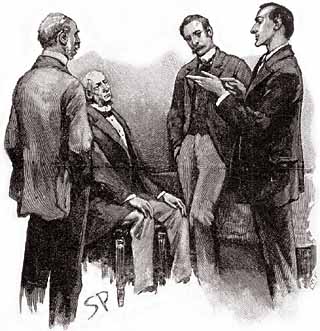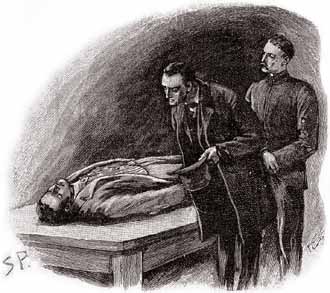| The Reigate Puzzle 8 | The Reigate Puzzle 9 |
Sherlock Holmes was as good as his word, for about one o’clock he rejoined us in the colonel’s smoking-room. He was accompanied by a little elderly gentleman, who was introduced to me as the Mr. Acton whose house had been the scene of the original burglary.
“I wished Mr. Acton to be present while I demonstrated this small matter to you,” said Holmes, “for it is natural that he should take a keen interest in the details. I am afraid, my dear Colonel, that you must regret the hour that you took in such a stormy petrel as I am.”
“On the contrary,” answered the colonel warmly, “I consider it the greatest privilege to have been permitted to study your methods of working. I confess that they quite surpass my expectations, and that I am utterly unable to account for your result. I have not yet seen the vestige of a clue.”
“I am afraid that my explanation may disillusion you, but it has always been my habit to hide none of my methods, either from my friend Watson or from anyone who might take an intelligent interest in them. But, first, as I am rather shaken by the knocking about which I had in the dressing-room, I think that I shall help myself to a dash of your brandy, Colonel. My strength has been rather tried of late.”
“I trust you had no more of those nervous attacks.”
Sherlock Holmes laughed heartily. “We will come to that in its turn,” said he. “I will lay an account of the case before you in its due order, showing you the various points which guided me in my decision. Pray interrupt me if there is any inference which is not perfectly clear to you.
“It is of the highest importance in the art of detection to be able to recognize, out of a number of facts, which are incidental and which vital. Otherwise your energy and attention must be dissipated instead of being concentrated. Now, in this case there was not the slightest doubt in my mind from the first that the key of the whole matter must be looked for in the scrap of paper in the dead man’s hand.
“Before going into this, I would draw your attention to the fact that, if Alec Cunningham’s narrative was correct, and if the assailant, after shooting William Kirwan, had instantly fled, then it obviously could not be he who tore the paper from the dead man’s hand. But if it was not he, it must have been Alec Cunningham himself, for by the time that the old man had descended several servants were upon the scene. The point is a simple one, but the inspector had overlooked it because he had started with the supposition that these county magnates had had nothing to do with the matter. Now, I make a point of never having any prejudices, and of following docilely wherever fact may lead me, and so, in the very first stage of the investigation, I found myself looking a little askance at the part which had been played by Mr. Alec Cunningham.

“And now I made a very careful examination of the corner of paper which the inspector had submitted to us. It was at once clear to me that it formed part of a very remarkable document. Here it is. Do you not now observe something very suggestive about it?”
“It has a very irregular look,” said the colonel.
“My dear sir,” cried Holmes, “there cannot be the least doubt in the world that it has been written by two persons doing alternate words. When I draw your attention to the strong t’s of ‘at’ and ‘to,’ and ask you to compare them with the weak ones of ‘quarter’ and ‘twelve,’ you will instantly recognize the fact. A very brief analysis of these four words would enable you to say with the utmost confidence that the ‘learn’ and the ‘maybe’ are written in the stronger hand, and the ‘what’ in the weaker.”
“By Jove, it’s as clear as day!” cried the colonel. “Why on earth should two men write a letter in such a fashion?”
“Obviously the business was a bad one, and one of the men who distrusted the other was determined that, whatever was done, each should have an equal hand in it. Now, of the two men, it is clear that the one who wrote the ‘at’ and ‘to’ was the ringleader.”
“How do you get at that?”
“We might deduce it from the mere character of the one hand as compared with the other. But we have more assured reasons than that for supposing it. If you examine this scrap with attention you will come to the conclusion that the man with the stronger hand wrote all his words first, leaving blanks for the other to fill up. These blanks were not always sufficient, and you can see that the second man had a squeeze to fit his ‘quarter’ in between the ‘at’ and the ‘to,’ showing that the latter were already written. The man who wrote all his words first is undoubtedly the man who planned the affair.”
“Excellent!” cried Mr. Acton.
“But very superficial,” said Holmes. “We come now, however, to a point which is of importance. You may not be aware that the deduction of a man’s age from his writing is one which has been brought to considerable accuracy by experts. In normal cases one can place a man in his true decade with tolerable confidence. I say normal cases, because ill-health and physical weakness reproduce the signs of old age, even when the invalid is a youth. In this case, looking at the bold, strong hand of the one, and the rather broken-backed appearance of the other, which still retains its legibility although the t’s have begun to lose their crossing, we can say that the one was a young man and the other was advanced in years without being positively decrepit.”
“Excellent!” cried Mr. Acton again.
“There is a further point, however, which is subtler and of greater interest. There is something in common between these hands. They belong to men who are blood-relatives. It may be most obvious to you in the Greek e’s, but to me there are many small points which indicate the same thing. I have no doubt at all that a family mannerism can be traced in these two specimens of writing. I am only, of course, giving you the leading results now of my examination of the paper. There were twenty-three other deductions which would be of more interest to experts than to you. They all tend to deepen the impression upon my mind that the Cunninghams, father and son, had written this letter.

“Having got so far, my next step was, of course, to examine into the details of the crime, and to see how far they would help us. I went up to the house with the inspector and saw all that was to be seen. The wound upon the dead man was, as I was able to determine with absolute confidence, fired from a revolver at the distance of something over four yards. There was no powder-blackening on the clothes. Evidently, therefore, Alec Cunningham had lied when he said that the two men were struggling when the shot was fired. Again, both father and son agreed as to the place where the man escaped into the road. At that point, however, as it happens, there is a broadish ditch, moist at the bottom. As there were no indications of boot-marks about this ditch, I was absolutely sure not only that the Cunninghams had again lied but that there had never been any unknown man upon the scene at all.
| The Reigate Puzzle 8 | The Reigate Puzzle 9 |